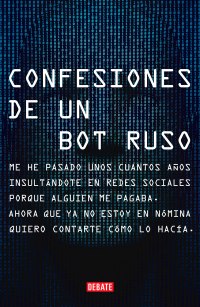
From the Debate publishing house we wanted to announce the imminent publication of Confessions of a Russian Bot, a book written by a former employee of an agency dedicated to astroturfing who, after resigning from his position, recounts his experience, opens our eyes and provides us with tools to avoid falling into the web of hoaxes and manipulation of our conversations.
In that sense, Confessions of a Russian Bot is a book written out of regret for the damage done. It is also designed to warn us against a business that, far from what we might think, is extremely sophisticated and threatens to leave control of information and public opinion in the hands of large corporations.
«We have witnessed in recent years how some agencies have spread fake news on the main digital channels and on social networks. Many users believe that misinformation is something that flourishes randomly, arising from lone wolves who throw messages into the air to see what they hunt. However, the source of all these messages is much deeper: behind each fake news there is a meticulous study of the information that we share on the Internet through social networks.
With an ironic and didactic approach, Russian Bot reveals how for years he had an army of trolls at his service, looking for the perfect moment to enter online conversations and start the hate machine. In an era in which anyone has a mobile device, the user is subjected to constant digital infoxication.
«Some time has passed since I left the agency and I must admit that, after my resignation, nothing has been the same as before I entered that world. “I have not been able to get rid of anxiety and I have become a distrustful and somewhat paranoid person.”
A story about the paradigm shift that produced the arrival of web 2.0. An exhibition of the consequences of social networks now being the greatest social thermometer.
«Astroturfing is a strategy that perverts the authenticity of that social thermometer and artificially drives citizen movements or opinion trends. Now, that doesn’t mean that all the lies we find on the internet are part of an astroturfing strategy, that they come from a public relations agency, or that they are intentional. Web 2.0 has given a voice to all users and, unfortunately, some of them have a lot of free time and lack ethics and morality.
Manipulating the conversation, altering surveys or other forms of participation, and putting in place the necessary mechanisms to silence a large part of the interlocutors is the objective of these agencies.
Source: https://algunoslibrosbuenos.com/confesiones-de-un-bot-ruso


